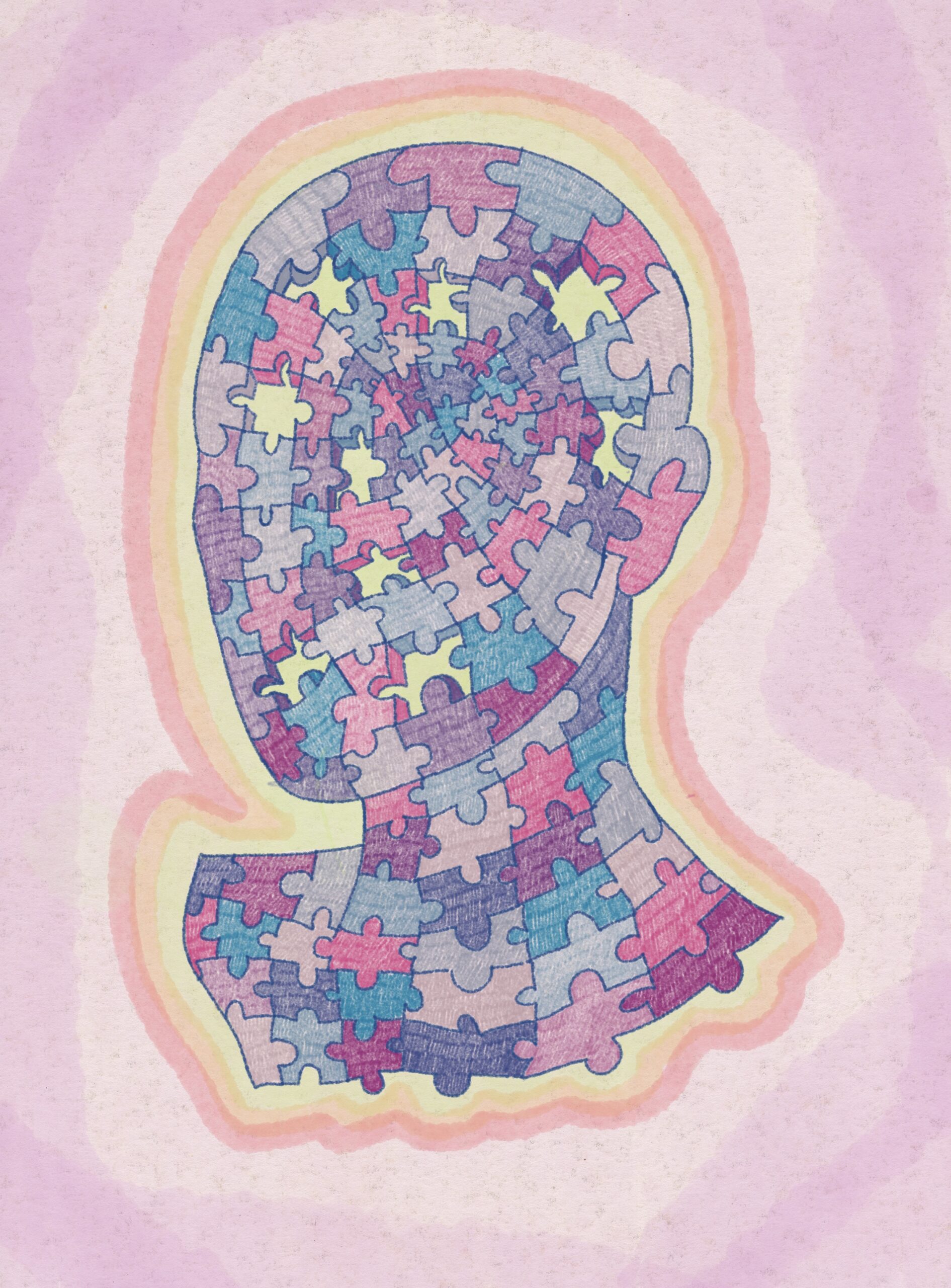
The ancient Greeks believed memories are what make us who we used to be, who we are, and who we become. Today, the question remains as relevant as ever: how exactly do memories shape our identity, and is it the case that certain types of memory are more important than others?
The ancient Greeks believed memories are what make us who we used to be, who we are, and who we become. Today, the question remains as relevant as ever: how exactly do memories shape our identity, and is it the case that certain types of memory are more important than others?

Illustration by Arianna Cavalli

Illustration by Arianna Cavalli
M was a good family friend. She was an elegant and kind-hearted woman, with a sharp, Scottish sense of humor. I fondly remember our family visits to M’s apartment in Oslo. She was married to a diplomat, so every time they served dinner, it was an eternal struggle to figure out which cutlery to use depending on the type of meal they were serving. M particularly enjoyed telling stories at the dinner table: about her childhood in Scotland, adventures with her dog, the struggles of being a foreigner in Norway, and many other experiences. Her stories certainly had an impact on me. They seemed to resonate deeply with my own experiences and emotions. Interestingly, storytelling not only has an impact on others, but it also has an impact on oneself. More specifically, it influences one’s sense of personal identity. Through storytelling, individuals construct narratives that reflect their unique perspective of their personal experiences. These narratives not only provide information of past events, but also reflect our values, beliefs, and cultural background, helping us understand the kind of person we are. By telling and reflecting on past stories, we can more easily answer the question: ‘Who am I?’
To maintain a coherent sense of identity, it is not storytelling per se that is vital, but rather what lies at its heart – memory. In fact, one could say that storytelling is the manifestation of memory, without which we could not recall our past experiences, learn from them, or understand who we are today. But what kinds of memories help us create our own sense of personal identity? Personal identity develops from declarative long-term memory, which is further categorized into episodic and semantic memory. Episodic memory pertains to memories of events, namely specific personal experiences from a particular time and place (Gazzaniga, Ivry, & Mangun, 2019). It plays an integral role in shaping one’s identity through the re-experiencing of events from one’s past, providing individuals with the content needed to construct a personal narrative – their life stories.
“Through storytelling, individuals construct narratives that reflect their unique perspective of their personal experiences. ”
In contrast, semantic memory refers to memories of objective knowledge that is factual in nature (Gazzaniga, Ivry, & Mangun, 2019). Unlike episodic memory, semantic memory does not include the context in which the information was learned. Within semantic memory, there are two types of self-related memories. First, there is factual self-knowledge, for example, the memory that I am 21 and I live in Amsterdam (Klein et al. 2004). Second, there is trait self-knowledge, such as I am adventurous. Trait self-knowledge encompasses one’s personality traits and often guides responses to questions you might encounter on personality tests or job interviews (Klein et al. 2004). Remarkably, this type of memory can be quite resilient in cases of severe memory impairment. In cases of total anterograde and retrograde episodic amnesia, patients can still describe their personal characteristics reliably and accurately, despite not being able to remember or form episodic memories. (Klein et al. 2004, 2010; Tulving 1993). This is because there are distinct brain areas responsible for episodic recollection and trait self-knowledge, and there is extensive evidence indicating a double dissociation between these areas, meaning they function independently of each other (Klein et al. 2008, 2010).
However, semantic trait knowledge of the self ‘is not sufficient for a sense of personal identity across time’ (Klein and Nichols, 2012), as personal identity is not solely built upon trait self-knowledge. This is exemplified by the case of patient D.B. who, after suffering a cardiac arrest and brain damage, could still retain knowledge of his own traits, but had no episodic memory (Klein et al. 2004, p. 466). While he knew what kind of person he was, he had no evidence from past memories to substantiate it. Without the ability to form a sense of existence in the past, patient D.B. lacked a cohesive sense of identity. Therefore, it appears that episodic memory is more important than semantic trait knowledge to establishing a personal identity (Atance and O’Neill 2005). The importance of episodic memory is highlighted in patients who, despite experiencing dramatic memory loss, still retain partially intact episodic memory, enabling them to maintain a sense of identity. Consider the well-known case of H.M., who had a significant part of his medial temporal lobes removed to treat seizures. Following surgery, H.M. couldn’t create new memories, but still enjoyed sharing some stories from his childhood. According to one of H.M.’s biographers, he recalled living in South Coventry, Connecticut, where he used to play with guns behind his house. He vividly remembered having a rifle with a scope, and he enthusiastically recounted having handguns like a .38 and a .32 (Hilts, 1995). The contrast between his past and present selves is heartfelt. Despite being unable to care for himself after the surgery, having difficulty remembering basic facts, and being unable to form new episodic memories, H.M. still thought of himself as the young man he used to be, with a .38 and .32 (Klein and Nichols, 2012).
“These narratives not only provide information of past events, but also reflect our values, beliefs, and cultural background, helping us understand the kind of person we are.”
An intact episodic memory seems to be necessary to derive a sense of self. And this became even clearer to me when M was diagnosed with dementia. Even though dementia manifests differently from person to person, she could still recall memories from her past. Despite the challenges posed by dementia, her ability to recall her past through personal stories served as a poignant reminder of the power of memory in shaping our sense of self. While she may no longer be with us, the wonderful moments we shared remain engraved in our memories, offering comfort and preserving the essence of the beautiful soul she was. <<
References
– Atance, C. M., & O’Neill, D. K. (2005). The emergence of episodic future thinking in humans. Learning and Motivation, 36(2), 126–144. https://doi.org/10.1016/j.lmot.2005.02.003
– Gazzaniga, M., Ivry, R. B., & Mangun, G. R. (2019). Cognitive Neuroscience: The Biology of the Mind (5th edition). New York: W. W. Norton
– Hilts, Philip J. 1995: Memory’s Ghost. New York: Simon & Schuster.
– Klein, S. B. (2004). The Cognitive Neuroscience of Knowing One’s Self. In M. S. Gazzaniga (Ed.), The cognitive neurosciences (3rd ed., pp. 1077–1089). Boston Review.
– Klein, S. B., Robertson, T. E., Gangi, C. E., & Loftus, J. (2008). The functional independence of trait self-knowledge: commentary on Sakaki (2007). Memory (Hove, England), 16(5), 556–565. https://doi.org/10.1080/09658210802010489
– Klein S. B. (2010). The self: as a construct in psychology and neuropsychological evidence for its multiplicity. Wiley interdisciplinary reviews. Cognitive science, 1(2), 172–183. https://doi.org/10.1002/wcs.25
– Klein, S. B., & Nichols, S. (2012). Memory and the Sense of Personal Identity. Mind, 121(483), 677–702. http://www.jstor.org/stable/23321780
– Tulving, E. (1993). Self-knowledge of an amnesic individual is represented abstractly. In T. K. Srull & R. S. Wyer, Jr. (Eds.), The mental representation of trait and autobiographical knowledge about the self (pp. 147–156). Lawrence Erlbaum Associates, Inc
M was a good family friend. She was an elegant and kind-hearted woman, with a sharp, Scottish sense of humor. I fondly remember our family visits to M’s apartment in Oslo. She was married to a diplomat, so every time they served dinner, it was an eternal struggle to figure out which cutlery to use depending on the type of meal they were serving. M particularly enjoyed telling stories at the dinner table: about her childhood in Scotland, adventures with her dog, the struggles of being a foreigner in Norway, and many other experiences. Her stories certainly had an impact on me. They seemed to resonate deeply with my own experiences and emotions. Interestingly, storytelling not only has an impact on others, but it also has an impact on oneself. More specifically, it influences one’s sense of personal identity. Through storytelling, individuals construct narratives that reflect their unique perspective of their personal experiences. These narratives not only provide information of past events, but also reflect our values, beliefs, and cultural background, helping us understand the kind of person we are. By telling and reflecting on past stories, we can more easily answer the question: ‘Who am I?’
To maintain a coherent sense of identity, it is not storytelling per se that is vital, but rather what lies at its heart – memory. In fact, one could say that storytelling is the manifestation of memory, without which we could not recall our past experiences, learn from them, or understand who we are today. But what kinds of memories help us create our own sense of personal identity? Personal identity develops from declarative long-term memory, which is further categorized into episodic and semantic memory. Episodic memory pertains to memories of events, namely specific personal experiences from a particular time and place (Gazzaniga, Ivry, & Mangun, 2019). It plays an integral role in shaping one’s identity through the re-experiencing of events from one’s past, providing individuals with the content needed to construct a personal narrative – their life stories.
“Through storytelling, individuals construct narratives that reflect their unique perspective of their personal experiences. ”
In contrast, semantic memory refers to memories of objective knowledge that is factual in nature (Gazzaniga, Ivry, & Mangun, 2019). Unlike episodic memory, semantic memory does not include the context in which the information was learned. Within semantic memory, there are two types of self-related memories. First, there is factual self-knowledge, for example, the memory that I am 21 and I live in Amsterdam (Klein et al. 2004). Second, there is trait self-knowledge, such as I am adventurous. Trait self-knowledge encompasses one’s personality traits and often guides responses to questions you might encounter on personality tests or job interviews (Klein et al. 2004). Remarkably, this type of memory can be quite resilient in cases of severe memory impairment. In cases of total anterograde and retrograde episodic amnesia, patients can still describe their personal characteristics reliably and accurately, despite not being able to remember or form episodic memories. (Klein et al. 2004, 2010; Tulving 1993). This is because there are distinct brain areas responsible for episodic recollection and trait self-knowledge, and there is extensive evidence indicating a double dissociation between these areas, meaning they function independently of each other (Klein et al. 2008, 2010).
However, semantic trait knowledge of the self ‘is not sufficient for a sense of personal identity across time’ (Klein and Nichols, 2012), as personal identity is not solely built upon trait self-knowledge. This is exemplified by the case of patient D.B. who, after suffering a cardiac arrest and brain damage, could still retain knowledge of his own traits, but had no episodic memory (Klein et al. 2004, p. 466). While he knew what kind of person he was, he had no evidence from past memories to substantiate it. Without the ability to form a sense of existence in the past, patient D.B. lacked a cohesive sense of identity. Therefore, it appears that episodic memory is more important than semantic trait knowledge to establishing a personal identity (Atance and O’Neill 2005). The importance of episodic memory is highlighted in patients who, despite experiencing dramatic memory loss, still retain partially intact episodic memory, enabling them to maintain a sense of identity. Consider the well-known case of H.M., who had a significant part of his medial temporal lobes removed to treat seizures. Following surgery, H.M. couldn’t create new memories, but still enjoyed sharing some stories from his childhood. According to one of H.M.’s biographers, he recalled living in South Coventry, Connecticut, where he used to play with guns behind his house. He vividly remembered having a rifle with a scope, and he enthusiastically recounted having handguns like a .38 and a .32 (Hilts, 1995). The contrast between his past and present selves is heartfelt. Despite being unable to care for himself after the surgery, having difficulty remembering basic facts, and being unable to form new episodic memories, H.M. still thought of himself as the young man he used to be, with a .38 and .32 (Klein and Nichols, 2012).
“These narratives not only provide information of past events, but also reflect our values, beliefs, and cultural background, helping us understand the kind of person we are.”
An intact episodic memory seems to be necessary to derive a sense of self. And this became even clearer to me when M was diagnosed with dementia. Even though dementia manifests differently from person to person, she could still recall memories from her past. Despite the challenges posed by dementia, her ability to recall her past through personal stories served as a poignant reminder of the power of memory in shaping our sense of self. While she may no longer be with us, the wonderful moments we shared remain engraved in our memories, offering comfort and preserving the essence of the beautiful soul she was. <<



